#Because the antagonists covered up what really happened with their story
Explore tagged Tumblr posts
Text
.
#dot post#ignore morg#whump cw#major injury cw#OP being blase about serious issues cw#spoilers for 30 year old anime cw#Okay but about the fave I mentioned in the tags on my last post.#Kyoji doesn't talk outside of flashbacks or dream sequences#That guy's clone literally and figuratively serves as his voice in the story.#his clone is the one who sets the record straight.#Because the antagonists covered up what really happened with their story#Of course I'm going to go#''he hit his head while being Komaroved through the atmosphere and the swelling *mangled* Broca's area''#it's thematic! (and very artistic license: biology but so is a lot of whump)
5 notes
·
View notes
Text
A Word of Advice About Critique Groups, Beta Readers, and Other Peer-Based Feedback on Your Writing
In my time as a professional editor, I've had many writers come to me with stories they've been trying to improve based on suggestions from critique groups, beta readers, or other non-professional feedback sources (friends, family, etc.). The writers are often frustrated because they don't agree with the feedback, they can't make sense of the comments they've gotten, or they've tried their best to implement the suggestions but now they've made a big mess of things and don't know where to go from here.
If this happens to you, you're not alone. Here's the deal.
Readers and beginning writers are great at sniffing out problems, but they can be terrible at recommending solutions. For that reason, critique groups can be a disastrous place for beginning writers to get advice.
Here's a good metaphor. Imagine you don’t know the first thing about cars. Someone tells you, “There’s oil leaking onto the driveway. You should cover the car with a giant garbage bag.” Alarmed, you oblige, only to be told the next day that “now the car smells like burning plastic and I can’t see out the windows.”
A mechanic would’ve listened to the critic’s complaint and come up with their own solution to the leaking oil, ignoring the amateur’s ridiculous idea, because they know how to fix cars and can use their skills to investigate symptoms and find the correct solution.
Critique groups actually aren’t bad places for experienced writers, because they can listen to the criticism, interpret it, and come up with their own remedies to the problems readers are complaining about. Beginning writers, on the other hand, can end up digging themselves into a deeper hole.
There's a great Neil Gaiman quote about this very conundrum:
Remember: when people tell you something’s wrong or doesn’t work for them, they are almost always right. When they tell you exactly what they think is wrong and how to fix it, they are almost always wrong.
So what to do?
First, try to investigate the reader's complaint and come up with your own solution, instead of taking their solution to the problem. Sometimes, in the end, the reader's solution was exactly right, which is lovely, but don't count on it. Do your own detective work.
Second, take everything you hear with a huge grain of salt, and run the numbers. Are 9 out of 10 readers complaining about your rushed ending? It's probably worth investigating. Does nobody have an issue with your abrasive antagonist except your cozy mystery-loving uncle? Then you might not need to worry about it.
Third, give everything you hear a gut check. Does the criticism, while painful, ring true? Or does it seem really off-base to you? Let the feedback sit for a week or so while you chill out. You might find you're less sensitive and open to what's been said after a little more time has passed.
Lastly, consider getting professional feedback on your writing. Part of my job as an editor is to listen to previous feedback the writer has gotten, figure out whether the readers were tracking the scent of legitimate problems, and offer the writer more coherent solutions. Of course, some professional editors aren't very good at this, just like some non-professional readers are amazing at it, so hiring someone isn't a guarantee. But editors usually have more experience taking a look under the hood and giving writers sound mechanical advice about their work, rather than spouting ideas off the top of their head that only add to the writer's confusion.
Hope this helps!
1K notes
·
View notes
Note
Hello! I write stories in horror genre. I've been wanting to incorporate more disabled characters in these, because I feel like they're really underrepresented in the genre except for either demonizing roles of antagonists, or a random victim who dies/is exploited for cheap shock because of their disability. One of the stories I'm working on has intellectually disabled protagonist/narrator. Are there any things you'd recommend to avoid in writing a character with ID in context of horror genre specifically?
Hey!
I have a few problems with ID characters in horror media. Two of the three biggest ones you've actually already covered in your ask, so I'll just add quick explanations for people not familiar with them.
First is the "big intellectually disabled man murders everyone", not even because he's evil or is seeking revenge or whatever, but because he "doesn't understand" that murder bad. It's absurdly insulting and writers don't seem to understand that a lot of real life cases where an ID man "committed" a brutal crime are a result of police manipulation and tricking them into "confessing", but that's a very long and frustrating topic.
Second one is the victim thing. Hardly exclusive to any minority, but with ID characters it often seems like they're the first of many victims and their death is usually ignored because who cares (granted, pretty realistic) until more people start dying and all that. Dogs tend to get more sympathy (also realistic).
Third thing that I hate is the "everything is normal... until the character is revealed to have mental [R word]! (scary music)". Generally in the sense that the situation seems completely fine, the protagonist has no actual traits of ID, but then at some point they find out they have ID (usually severe or profound, which is ridiculous in this context) and suddenly the actions of those around them are pretty clearly fucked up (the character is actually held hostage, kidnapped, about to be murdered, you get it). It uses intellectual disability as a shock factor and as some worst-case scenario nightmare fuel for abled people, even though the situation makes no sense (no, a profoundly ID person isn't going to be reading their medical records and find out this way) and wouldn't happen. It's insulting nonsense.
Another thing that is insensitive in my opinion is the institution/SPED setting. Definitely not because nothing evil happens in there (quite the opposite) but because the way it's usually treated is completely devoid of empathy and the actual victims are portrayed as animals almost (or not so almost). I'd just stray away from the extreme real-life abuse scenarios (abusive caregivers, borderline slavery "work"places, purposeful medical malpractice) that do actually happen if you don't have a lot of experience or aren't working with someone who does.
Last thing, kinda connected to the third, is to not make any bizarre connections between the disability and the horror. ID can make someone trust others more which could lead to a situation that's potentially Scary, but it doesn't have much to do with demons or the parents doing something fucked up before the person was born.
There are of course other things that are kinda tired, but not completely made-up. ID people are victims of crime way more often, that's a statistic that's been true since the dawn of time. But it doesn't mean that they won't fight back because they're disabled. I'd love to see a character who actually wins against the antagonist at some point (even if just for a moment, considering it's horror) - whether they're physically stronger, or know the place better so they get away, or manage to keep calm because they haven't realized they're in a dangerous situation, it would be awesome to see.
Some additional notes that might or might not apply depending on what kind of horror it is;
A lot of people with ID aren't going to be reacting to the regular horror stuff the same way as your average horror character might. They might not think much when they hear a Suspicious Sound and not go investigate it, or be too scared because it's an Unfamiliar Situation. What would be more realistic in a scenario like this is the ID character actually reaching out for help (depends on the settings what that would be); most of us get it drilled into our brain to listen to authority, so they would probably be calling the cops rather than going into the Scary Basement, even if just in the fear of not doing the thing you're supposed to.
In more of an eldritch horror setting where there is an incomprehensible Thing happening, a character with a significant intellectual disability literally has an advantage over abled people. It's just one of many incomprehensible things. Many of us are simply used to ignoring things that don't make sense since the majority of people don't have the patience to explain things in a way that's actually helpful.
It'd be also cool for the ID character to actually have a goal, objective, or whatever else to drive them forward and have some development. Whether that would be the desire to find out who murdered their ex-husband, or why the sink has blood instead of water, or just to survive the voyage, basically anything other than just standing there only experiencing things when some abled savior shows up and tells them how to feel and what to do (both bad for an ID character but also just a poorly written protagonist of any kind).
Hope this helps,
mod Sasza
142 notes
·
View notes
Text
Let's address the blue suited elephant in the room!

I want to preface this by saying, of course, what Prosciutto does to pesci isn't okay in the slightest. He's a grown man who should keep his hands to himself, but i do want to talk about the scene itself and how araki has addressed this in the new la squadra lore drop.
If you've ever read or watched part 5, you must be familiar with pesci and proscuitto. The dynamic these two shared was quite unique, considering that at the time Araki wrote these two, we didn't really see two minor antagonist banter and interact with each other in the same way they did.
People who like La squadra have especially taken a liking to the dynamic Pesci and Proscuitto share, but one thing that we don't really talk about or acknowledge is the fact that proscuitto hits / manhandles pesci. So let's talk about it!



When you think of Prosciutto, your first thought might not be kind and doting. However, Araki goes on to emphasize that prosciutto is too soft on Pesci and praises him too much.
"This makes it a total of FIVE TIMES he supported pesci in an hour."
"People might wonder if Prosciutto was being over protective"
This makes sense in the context of the episodes, and Araki also goes on to state Prosciutto cares very deeply about pesci, to the point his love is deeper than that of a mothers love.

Araki tells us readers that the only time prosciutto has used the "stick treatment" was when pesci got ambushed by Mista but he quickly brushes it aside by highlighting the fact prosciutto was brave and grabbed the gunslinger risking his own life to save that of pesci.

"My prized hook and line" written by yoshihita okita, does a reversal of what araki has shown us. Instead of pesci constantly being praised by proscuitto, pesci gets scolded multiple times throughout the short story, and it is only at the end that we see proscuitto praising pesci for doing the right thing. This signals a turn in how proscuitto views his subordinate.
--
Prosciutto's actions and Pesci’s Reactions
Now, this is where the novel differs from what we see in canon and where I start to project some of my own thoughts and feelings on these scenes. It's not exactly a one to one comparison, but it'll do.
Leading up to the impact in the anime, we see pesci praising prosciutto on how amazing he is for disguising himself as one of the passengers. Even though pesci nearly got himself killed, he still excitedly walks up to prosciutto. So when prosciutto hits him, he looks genuinely confused because he didn't expect that to happen. THIS makes sense in combination with what araki has told us.
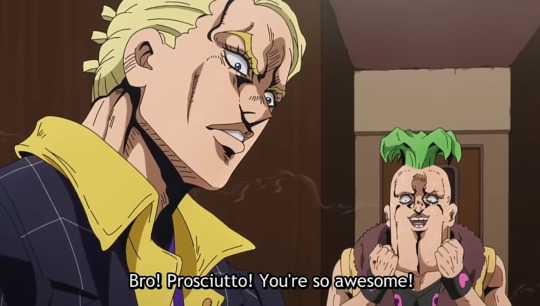
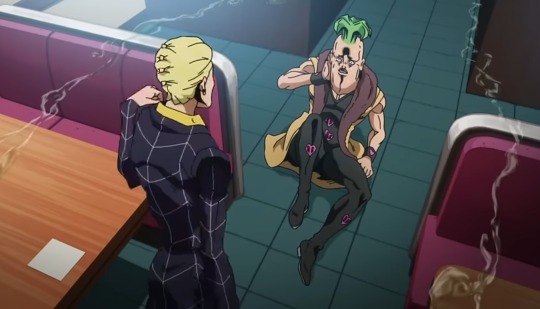
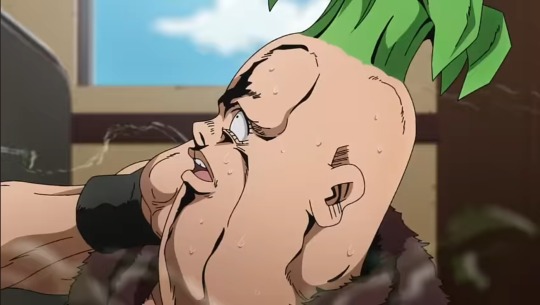
Prosciutto is overprotective and praises pesci too much because he deeply cares for him and his safety. Of course, pesci would feel comfortable walking up to prosciutto. He hasn't given pesci a reason to make him feel otherwise. However, the stakes are much higher than normal they went on this train knowing they'd either come out victorious or die trying to obtain their goal. But pesci still doesn't act like it, and so in the heat of the moment, prosciutto hits him, which gets followed by the 5 times of praise Araki loves to mention.
In the novel, Prosciutto doesn't actually hit Pesci, but he does instinctively cover his face out of fear of being hit. This doesn't exactly contradict what Araki has told us, but this pesci is much more fearful of Prosciutto, which would make sense because this takes place when pesci has freshly joined the team and hasn't really realized which buttons he can and cannot push.
(I think it's also important to keep in mind this wonderful short story wasn't written by Araki himself, so obviously, the way the characters interact and behave aren't going to be 100% accurate. However, it did get approved, so it's up to you to decide whether or not you want to accept this as canon or not)
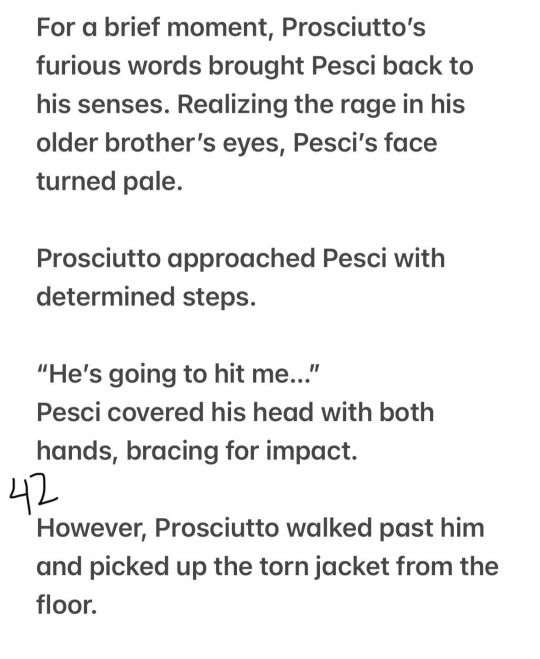
--
What happens after?
In the novel, there's not really anything that happens after because nobody's getting hit, so we're going to be focusing on the anime.
If you've seen the episode, we all know what happens after. Prosciutto starts giving pesci pep talks and praising him and touching foreheads invading pesci's space. This exclusively happens after Prosciutto hits him. Why is that? Why do that after decking pesci in the face?
Well, it's because pesci lost the confidence he had after being scolded so harshly by his mentor. In the anime, the difference between before and after isn't very noticeable because pesci has been changed to come across as more meak and shy. But in the manga, pesci goes from a playful and cocky newbie to a meak and anxiety filled mammone in almost an instant. THAT is why prosciutto goes overboard with the praise and PDA. He's aware of what type of impact it has on pesci and tries his best to steer pesci back in the right direction with kind words.
--
(I'd place some examples here but I've reached my limit unfortunately)
Conclusion
I'm not really sure how I want to end this, but regardless of how you see pesci and proscuitto's relationship, I think it's very important that we continue to have fun and mess around with their dynamic as two characters in our favorite show. You can choose to ignore that prosciutto has done this, or you can choose to come up with your own explanation for his behavior, but at the end of the day, we're all here to have a good time.
Thank you so much for taking the time of your day to read this <3
#jjba#jjba part 5#jjba fandom#la squadra#pesci#jjba pesci#la squadra di esecuzione#jjba proscuitto#prosciutto#rambling about my faves#really wanted to get this out of my system#this was not proof read#golden wind#vento auro
75 notes
·
View notes
Note
Why do you hate the Once and Future Knight? I decided not to pick up the book because of personal preference but I’d love to hear your rant on it
Hi anon!
I’m assuming you mean The Once and Future King by TH White?
There’s nothing I could say that hasn’t already been said before I’m sure. But I didn’t read the series until I had already read many other Arthurian tales and I really don’t understand the love the series gets. The negatives don’t outweigh the positives, and worse, the lasting impact of TH White’s characterization choices on subsequent retellings is a stain on the literary tradition that set us back too far to comprehend. Putting my rant below a cut because I went off and the subject matter is disgusting.
First and foremost, the bigotry is astounding. The racism, the misogyny, the ableism and every other prejudice and cruelty you can think of are staggering in their variety and magnitude. It’s vile. It’s inexcusable. I don’t read modern Arthurian retellings to be bombarded with that in every single chapter. TOAFK is not “a product of its time.” It’s a product of a deeply unhappy and hateful man. Plenty of earlier writing is vastly kinder to Palomides and Guinevere and Morgause and Mordred and Lancelot or any other character unlucky enough to be depicted by TH White. Literally the Medieval source material is more nuanced than that. Morgause get behind me.
Secondly, the anachronism is an annoying stylistic choice at best and yet another tool for bigotry at worst. Why are Mordred and Agravaine likened to Nazis? Like seriously what the hell? It’s not enough for them to be antagonists, the text has to invoke the Holocaust? It’s so extreme it rips the reader right out of the story and calls to mind the most horrific parts of history for no narrative benefit whatsoever. Baffling and bad.
Thirdly, the prose just kinda sucks. It’s rambling and TH White will pause the narrative to stand on a soap box to talk at the reader about his views. He’s anti-war. Fine. But of all characters to use as a mouthpiece—King Arthur? The warlord King Arthur? Make it make sense.
Fourth, most tragically of all, so much of what TH White did in his series is reflected in stories told to this day. Every other retelling has a cover quote comparing it to TOAFK. (It’s supposed to be a compliment!) To put it in perspective…
You ever read a retelling with evil neglectful parent and rapist Morgause/Morgan? TH White’s fault.
How about added incest between one of the Orkney bros and their mother (which sometimes results in someone other than Gaheris killing her, say, Agravaine or Mordred)? Thanks, TH White, that’s just what Arthurian Legend was missing, more incest.
Ever see disabled, crippled, bad seed Mordred? TH White started that trend.
What about Guinevere assaulting Lancelot when she learns about Elaine getting him drunk and raping him? TH White really said “Lol what if Guinevere hits Lancelot and spits in his face while he’s crying?”
And the racism! TH White walked so Thomas Berger could run (derogatory). Discussions of race are so intense and so frequent and so random like one minute the narrator has paused the plot to talk about how war is bad and now it’s slandering Native Americans? Brother this is Medieval England what is even happening right now? Oh, look, another N bomb. The antisemitism! Weren’t you just comparing Mordred to Hitler? What do you mean the Orcadian/Scottish characters are evil because of *checks notes* “the incalculable miasma which is the leading feature of the Gaelic brain?” [Queen of Air and Darkness chapter 5] Thanks TH White for stripping Lot, Morgause, Gawain, Agravaine, Gaheris, Gareth, and Mordred of all nuance, a condition from which they have, literally, never recovered. Of course there are some retellings since that write one or two of them with a crumb of nuance, but they’ll never be like they were in the Vulgate. Not all at the same time. I feel sick.
It goes on and on. I have to stop listing examples or I’ll get pissed off. But frankly, more people should be pissed off about it! I’m tired of seeing five star reviews on storygraph and goodreads accompanied by a review excusing the most bigoted garbage I have ever read in a children’s book. It’s vile and everyone should feel bad about defending it. It’s inexcusable. This wasn’t a case of good-intentioned inclusion with dated language, this was an author going out of his way to be hateful. Period.
Big names in the fantasy book community like Daniel Greene should not be awarding five stars and leaving an uncritical review.
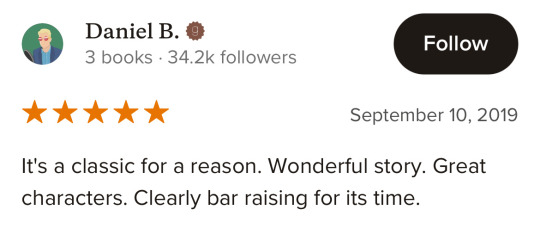
Far too many readers acknowledge the racism and then rate it five stars anyway. Go to Hell, Spencer.
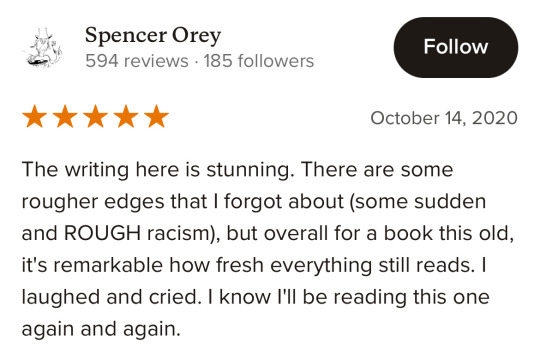
Here’s some from storygraph with, of course, praise for Marion Zimmer-Bradley’s pedophilic power fantasy Mists of Avalon, another piece of hot festering sludge everyone should stop talking about. Kill the legacy already. The real life victims have suffered enough.
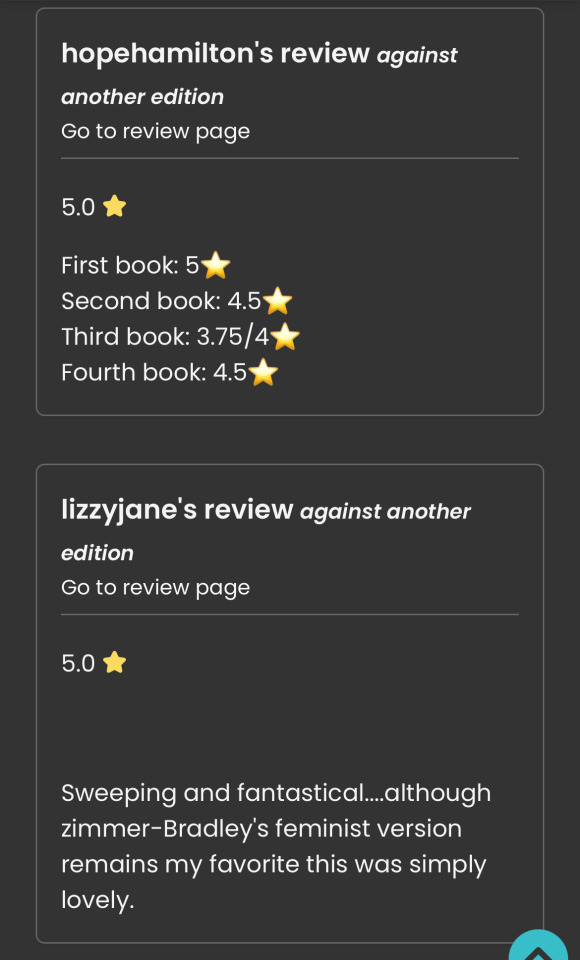
There also seems to be a trend in these reviews that excuse the texts bigotry by referring to how “old” it is. Which is crazy to me for many reasons. TOAFK in its final form was published in 1958. That wasn’t that long ago. Also racism has always been racism, misogyny has always been misogyny, ableism has ways been ableism. Plenty of authors came before this and really make TH White look like a clown.
Let’s promote them. In reverse!
John Steinbeck wrote The Acts of King Arthur and His Noble Knights in 1956 (published posthumously in the 70s, don’t go by that date). His depictions of Morgan and Guinevere are nuanced and fascinating, not to mention some original characters including an old granny who teaches Owain to be a warrior! This book also has a morally gray sun-powered Gawain without insulting his heritage, an emotional and thought-provoking Lancelot without marking his sin with a facial deformity, and a really sweet Marhalt who doesn’t often get much spotlight!
John Erskine wrote Restoring Palamede in 1932. He does exactly what the cover says, and writes a story about the Muslim knight Palomides beginning in his own country, living with his parents whom are both named, and follows him as he learns the ways of the world and finds an ally in his friend Brangaine! Tristan and Isolde are compelling here and while Tristan can still be a jerk to Palomides, it’s not the mask-off bigotry we’ve seen…elsewhere.
Howard Pyle wrote one, two, three, four books between 1903-1910. Two thumbs up from me. No notes. He drank his respect women juice, drew them with loving care, named so many previously unknown, and gave them voices. He was kind in his portrayal to Palomides and even some other knights of color from India. Morgause survives the narrative! We love to see it!!!
Henry Newbolt wrote Mordred: A Tragedy in 1895. A fascinating examination of family ties, all five Orkney brothers here AND their wives Lyonors, Lynette, and Laurel! (Minus Ragnelle bc life is unfair.) Guinevere and Lancelot are tragic and heart wrenching. Arthur struggles against his son Mordred and their destiny in a way that doesn’t outright demonize either side. It will rewire your brain.
Richard Hovey wrote his poetry between 1891-1900. A complex and interesting Guinevere and Elaine who are not enemies, Lancelot close with Galehaut during the war, destroyed by his torn loyalties between Arthur and Guinevere, Gawain who loves his friend Lancelot with all his heart, and so much more without tearing anyone down!
Oscar Fay Adams wrote his poetry between 1886-1906. Here we get a wide variety of character focus, with title-featured names from King Lot to Dagonet to Lamorak to Lionel. Each one is more fascinating and nuanced and fresh than the last, from a tour of Lot’s castle and meeting each inhabitant to Lamorak on Grail Quest learning to forgive himself from “sweet” Sagramore.
William Morris wrote his poetry between 1856-1910. All of it is on the Camelot Project but I also have this scanned book. Here we delve into Guinevere’s trial as she calls out those who have wronged her, lonely Galahad on Grail Quest relating to his father Lancelot and praising Palomides in his steadfast hunt of the Questing Beast, there’s even a poem named for Palomides himself!!!
Anonymous wrote Moriaen in the 13th century. It follows Aglovale’s illegitimate son Moriaen, who is of African descent. As he travels around Britain looking for his father, Moriaen meets many people who are afraid of his dark skin. BUT! All the Knights of the Round Table leap to his defense, even threatening townsfolk who try to demonize Moriaen for the way he looks and refuse him service. It is, essentially, an anti-racism story from the Medieval era. Not to mention healer Gawain’s care and attention given to the sick and disabled. That’s not even the moral/focus of the story so much as Moriaen’s journey, but it’s there and worth mentioning.
So here we are with a whole list of stuff to read that predates TOAFK and surpasses it. The last one is only sort of a joke. But it’s there to make a point about how inexcusable TH White’s racism really is. If Anonymous could give a black knight like Moriaen the narrative respect he’s entitled to for existing as a representation of real human beings that look like him, then TH White was capable of it too. Progress is not linear. This is not to say Medieval times were “better” than society today. But to write off any problematic story of the recent past as “a product of its time” as an excuse to make oneself feel better about liking it, well, I don’t know what to say. Maybe reflect on that. And while that marinates, read something else.
119 notes
·
View notes
Text
DP x DC: Dash
I just realized I haven’t seen a lot of things that actually utilize Dash as a character
Like, there’s things that have a character named Dash who is in it to some degree, but I don’t think I’ve seen something that uses the character
What do I mean by that?
Look at the character of Dash in Danny Phantom, he’s an archetypal popular high school quarterback bully type. He’s the Flash Thompson to Danny’s Spider-Man. His purpose in the show is as a minor antagonistic force, not really an antagonist on his own, he sets up Danny as an underdog “unpopular” kid, and a source of comedy
But he also has a tiny dog named Pookie and fanboys hard over Phantom despite bullying Fenton, and he really likes football, has his best friend Kwan, he struggles with his grades, and dislikes feeling small and weak, something he explicitly says in an episode. There are some genuinely interesting character traits a person can use in a story
And I think that any of the few times I’ve seen him used in this crossover, besides 1 or 2 fics, you could have covered up his name and I would not have been able to tell who the character is because none of his actual character traits were used
Which I think is a shame because there is utility to having him as a character. There’s personal conflict and growth regarding him bullying/having been a bully to Danny
Plus the classic “is a bully because of internalized homophobia and has feelings for the one he bullies” it’s the entire dynamic of “swagger bishie” Dash and Danny’s ship. You could just as easily transpose that to another character
Or even just “makes things more complicated by being involved in a situation where Danny has to protect him” Imagine how tempting it would be to just let something happen to him? The conflict, the desire to just not save this one person
And of course
“Jason Todd breaking into Dash’s room and threatening to end his football career by shooting him in the kneecap, all because Dash bullied Danny”
There’s utility in using Dash’s actual character traits and I think we really undersell him as an interesting character that can add a little something to a story
#dp x dc#dp x dc crossover#dp x dc prompt#dpxdc#dash baxter#definitely don’t have to use him#but using some of his character traits adds spice when he is being used#he’s not necessarily a good person#definitely a shitty teen#but that adds something#it’s a spice#maybe not one you want to use for every dish#but a little goes a long way
207 notes
·
View notes
Text
I expect Billy is going to be an antagonist for a while and that's OK
Anti's for either Agatha or Billy are probably going to get more intense as I predict our boy Billy's gonna be antagonistic for a bit. And let's be clear, I'm not hating, or saying either are evil, or in the wrong.
That's way too simple a take for this show. In the words of showrunner Jac Schaeffer:
...we populated the show with similarly flawed individuals who are also selfish and self-serving, who are self-sabotaging, who are constantly standing in their own way. And then they were just in conflict. Everybody is kind of an anti-hero in the show. That was really fun and felt very truthful there.
No one here is meant to be a pure "good guy", which is I think kind of Billy's arc -- but more on that later.
And when I mean antagonist I'm talking about the characters roles in the story. An antagonist isn't necessarily a villain. Agatha is the show's protagonist as well as its main antagonist: as much as she claims she wants only power, deep down she wants a coven, a community, a family. But she is as Schaeffer puts it, "in the way of her own thing."
Billy being an antagonist simply means that his goals – or some of them at least – conflict with Agatha's. Rio has been described as a "romantic antagonist" as well because some of her goals are also in conflict.
Long text speculation post and mild promo spoilers under the cut:
Let's first get this out of the way: Why do I think Billy's going to take on an antagonist role? Aside from well, all the things that happened at the end of Episode 5, there's some clues Billy's not all who he's been saying he is:
There's a promotional video with audio lines, and you can hear Billy saying things like "Agatha Harkness can never be anything but a covenless witch" and "I do not trust you".
Billy claiming to be "obsessed" about Agatha and her biggest fan and going on the road for power should know that she is the world's most notorious witch-killer – why is he appalled about her killing and so against it? And if episode 5 is any indication, power is not what he's lacking.
Joe and Schaeffer have mentioned that Billy will be different in the back half of episodes.
A quick clip from a trailer has Agatha (covered in mud) telling Billy "Last one there is a nice person", implying that Billy at this point doesn't want to be nice. I assume, at this point, he wants Agatha to pay for her misdeeds. The yellow tint of the clip also matches with the current Road area they're on.
Now at this point I do not know if Billy was involved in what I believe is a fake trial in episode 5. I'm inclined to think it's the Salem Seven, and we get this truth of Billy as fallout. I believe he definitely didn't want Alice dead.
Now for reasons why I think it'll be okay–even interesting–to have these two in conflict and everyone should put away their pitchfolks:
They are going to come to an understanding
You know how in Hawkeye series Yelena wants to kill Barton because she blames him for Natasha's death? I think we'll get a broadly similar arc or vibe for Agatha and Billy here. And they will design it in a similarly emotionally satisfying manner.
Right now Billy's basically like everyone–including the rest of the coven–who believes that Agatha is truly what her reputation says. And that's not surprising! Agatha is masks and layers and theatrics and she's not opening up unless she absolutely has to.
It may take a few episodes but I expect we'll get that before the series end, with this sobering exchange we have from a trailer:
Why do you let them believe those things about you? Because the truth is too awful.
I don't think Billy will be the Big Bad simply because I expect at the end Agatha's going to have to choose between wanting her coven, her community of witches, and something else—power perhaps, or her son, and go back to her old ways.
And for that to happen Agatha will need to have formed enough bonds with her coven, including Billy, to make it a difficult choice.
Power, darkness, and anti-heroes
Look, Agatha is my babe and she definitely needs a win after all that awful that happened in episode 5, but if you think about it Billy being a lot like his mom is really interesting? More interesting than him just being a cute innocent fanboy.
Because if he is an anti-hero, with some darkness in him, it's an opportunity to explore some of the themes or ideas we touched on in Wandavision with Wanda and her power, and her sense of self.
Heroes don't torture people.
Agatha recognises the darkness in people, delights in it even: as touched on in interviews, it's one of the reasons why she saw herself as Detective Agnes in that spell, as an investigator exploring the darkest aspects of humanity. She's seen the worst in people, and knows how to play the villain.
For Billy to avoid making the same mistakes as his mom, he needs to understand not just his power, but his potential for darkness.
Power corrupts, and when you're born with that reality-warping level of power, it's dangerous. It's so tempting to make people do what you need them to. And it's a slippery slope once you start killing, even if it's for good reasons.
Agatha never wanted to kill her first coven, in that moment she only wanted to live. But she did, with a power she never asked for, that made it so easy to keep taking and taking.
It is kind of tragic given the circumstances that Agatha couldn't have been a mentor to Wanda at the end of Wandavision, given the events of Multiverse of Madness, because she made some valid points and they could have been a coven, given Agatha's deep-deep-buried desire for one.
And looking at all the mentor-kid pairings we've seen in the MCU so far (Parker and Stark, Clint and Bishop, Strange and Chavez, etc.), I don't think we've ever had this kind of dynamic.
Interesting power dynamics
I think Agatha is at her most interesting when she's on the back foot. As we've seen in episode one, she's not one to give up when physically outmatched, quite the opposite. She's a survivor, she's stubborn, and she's a performer.
Billy has been revealed to have the magical equivalent of a gun, and is capable of taking this entire coven hostage.
They're going to have to interact in new ways now. But now it's going to be more of a dance.
It's new danger, new complications, but also new ways to connect, and also the opportunity for a more honest relationship.
Knowledge, history, community
This point isn't specific only to Agatha and Billy but I'm reminded of Billy taking it out not just on Agatha but Lilia and Jen as well.
It's not surprising that Alice and Billy, the two youngest coven members are also the most idealistic and noble. The world has not been kind to witches over the centuries—Lilia's been chased out of villages for her visions, Jen has been attacked—and the older members of the group have done what they can to survive: How much can you blame them for being selfish in a cruel world?
Power isn't your problem, it's knowledge.
In this case I mean not just the knowledge of witchcraft, but lived experience as well.
Younger witches have to learn their community's history, and the older ones have to be challenged in their set ways of thinking, in how they've adapted, because they're not always good.
I wouldn't be surprised if there was an allegory to be made here to the queer community as well. Schaeffer has mentioned there is a large overlap between the history and persecution of witches and that of the LGBTQ community.
--
Good lord this post ran away from me. If you actually read all of that you do deserve a cookie.
#agatha all along#tv: agatha all along#agatha harkness#thoughts and spectulation#written mostly for me i guess#my evidence wall isn't getting smaller#AAA meta
60 notes
·
View notes
Text
Umineko Episode 1 Blog: Tea Party
For the first time since this blog began, I'm covering new content and I'm happy to report that Ryukishi wrote this scene to make fun of me specifically.

This Tea Party was initially framed as some kind of non-canon bonus scene, and of course we can't interpret its events entirely literally, but by the end it seems that this scene is cryptically revealing the fates of the grandchildren, who disappeared at the end of Episode 1. Of course, even when the game is keeping up it's cheerful facade, it should not escape our notice that the 6 people depicted here are Shannon, Kanon, Maria, George, Jessica and Battler: precisely the 6 people who are still alive at the end of Episode 1 (that we know of).
The game's pointed comments about how there's clearly a 19th person because of how Kanon died, and "wow I guess it was magic the whole time there's really no way around it," feel playful. I'm also very amused by the narrator dropping the facade of reliability and constantly mocking Battler's skepticism. We're all in on the joke now, so there's no reason to keep up the pretense that this scene is anything approaching an accurate depiction of events.
Also, we are going full tilt on the meta stuff here, aren't we? I'm sure you're all loving how Battler's constant half-baked speculations sound more or less exactly like me.


We get some new character profiles, an rather interestingly they only confirm the deaths of Jessica and George. Rather gruesomely at that. Maria is merely missing, and we never see her actually die. Presumably this is because she still needs to live long enough to write the message in a bottle. I wonder if this scene shaking her faith in the witch is what inspired her to write the story and beg someone to try and solve it. Battler also doesn't die, so who knows what's going on with him?
I was intruiged by Battler's "if you believe in a lie, it becomes the truth?" line. To me, it sounds like the grandchildren were approached by the "witch," with the resurrections serving as proof that magic is real. When Battler questioned it, the conversation morphed into a veiled threat: if the grandchildren know what's good for them, they will accept that it was magic and never dig into the true story of what happened on Rokkenjima. Battler doubles down and so the culprits decide they have no choice but to remove all of the witnesses, at which point Battler defends himself with the gun.
Something like that could work as an explanation for the grandchildren's fates, although I don't see how this narrative could explain Jessica and George being brutalised so horribly. We were told in the endscroll that their gory deaths really did happen.
The Tea Party is really beating us over the head with Beatrice's symbolic significance. Just like how the servants used to invoke her name, Beatrice is the God of the Gaps (with one 'a'). It's not that anything you can't explain gets blamed on her, but that Beatrice is the inexplicable. Any time you throw your hands up in the air and say it can't be solved, you bring Beatrice to life, and to defeat her you have to solve the case. She's the antagonist of mystery stories themselves.
I'm not sure how this ties in to her supposed power to "kill an individual endlessly". Perhaps Bernkastel's line sheds some light. She describes Beatrice as one who plays a dice game by never letting go of the dice, so whatever the roll could have been, she is not disappointed. Beatrice is a being that thrives off of ambiguity. The moment anything has a clear explanation she's helpless. In this sense, is her "endless" killing of an individual in reference to the seemingly limitless possibilities for how one of the bodies could have died?
Speaking of Bernkastel, the witch who looks a lot like that girl from Higaurashi (which I've never seen, so don't tell me if this resemblance matters), the description of her power reminds me a lot of that famous Sherlock Holmes quote "once you eliminate the impossible, whatever remains, no matter how improbable, must be the truth." Bernkastel can make any potentiality into a certainty, so long as it is not impossible. In other words, she symbolises the process of elimination, so it makes sense that she's aligning herself more with those of us trying to solve the mystery. This symbolism also ties into her comment about her matchup with Beatrice: once you accept magic, you can no longer rule out the impossible, so the process of elmination doesn't work.
I'm not sure what Lambdadelta's deal is, but then we haven't seen her personally. If we want to interpret her through the mystery genre lens, one guess would be that she represents the point at which we can say for certain that a character is actually dead, rather than just faking somehow? She could also be a play on the anthropic principle: to solve a mystery we must tell a story about what happened, and this story must end with the person dead and the body in the state that it was found in. In other words, we proceed by "making that person's death into a certainty," taking it for granted that they're dead and rearranging all the other facts to fit that truth.
Bernkastel leaves us with some advice which basically amounts to telling us that Beatrice is a metaphor, but she also leaves us with something else interesting:

Umineko doesn't use all caps like this very often. The only other time I can remember is the scene where the narrator wants to make sure that the siblings really needed A LOT OF MONEY RIGHT NOW. I don't know if there's anything to that, but maybe there is.
Bernkastel also has an interesting line about preceiving us like a character on TV, so maybe there's going to be some kind of metaphor with witches standing in for viewers or authors at some point.
That's all for now. I didn't expect to have so much to write about 2 scenes, but they were important scenes indeed. Don't expect me to keep up this pace going forward!
I almost forgot to mention that Purgatorio reference right at the start. What's that about? Is Beatrice's name a reference to the Divine Comedy? I hope that doesn't end up being important, beyond Kinzo's pining after her being a reference to Dante's. If I didn't bother reading And Then There Were None for context after noticing the parallels, then I'm certainly not reading that.
The Main Menu is an aquarium now? What on Earth is Episode 2 even about?
#umineko when they cry#umineko liveblog#umineko episode 1#umineko no naku koro ni#umineko#liveblogging
19 notes
·
View notes
Text
Honestly I would love a Splatoon game geared at a 13+ / older audience- or even one still aimed at the same audience that really addresses the topics it brings up.
Splatoon covers darker / more mature topics. Child soldiers shooting each other, invading the land of another species for profit, suppressing another species for over a literal century, how extreme fame affects people, being ostracized / “found out” for being different, being terrified of change, etc. but it never really covers them.
They are there: especially when you look into things like the sunken scrolls or resources outside of the game, but that’s kind of it. And that’s fine!! You don’t have to address them more obviously if you don’t want to. It’s a kids game first and foremost (and even if that isn’t really a great excuse, whatever).
But I would love a game that delves more into these topics, or just getting into these characters heads more. Using outside information and reasoning stuff, we can analyze basically every character well, but we never really see any confirmation in the game for most of it. We know from the relationship chart and the squid sisters stories and whatnot that Callie willingly went to the Octarians, likely due to the pressure of fame and being on her own, but this is never really explored in the game which sucks because there’s so much potential there! Comments on how fame affects people, escapism, and Callie’s, essentially inability, to be alone (since she’s able to step back into the spotlight again once she has Marie with her, both with the squid sisters performances obv but also the news/map announcement thing). And I get that that’s not the story they were trying to tell, but it would be so nice to have a game that delves into this stuff rather than leaving it off to the side where most of the playerbase probably doesn’t know about it.
Splatoon has a really big problem with exploring character’s darker parts of them / adding complexity to characters. Take Callie again: hypnosis cannot make you do anything that you don’t want to do, so hypno Callie’s personality was still Callie, just those darker parts. And that’s just- kind of ignored, past a few one liners (deep cut’s introduction scene.) Then the same exact thing happens with Marina, except we don’t even get to delve into it as much because it is literal brainwashing or mind control or something where she very obviously has her free will taken away. Which sucks!! Because it would have been so interesting to delve into that desperation that comes with wanting things to stay the same, unintentionally hurting the people you’re trying to help / protect, all of that kind of stuff, and then it’s just shrugged off for the rest of the DLC. Which, again, it’s fine that they didn’t want to tell that story: but it’s still missed potential regarding Marina.
This even affects antagonists, too: mainly Octavio. This is kind of remedied by him helping us in Splatoon 3, but it’s never really explored. He does what he does to help his people because they are literally dying from a lack of resources + power. I like the fact that the Splatoon 1 story doesn’t address this, but it could have been really interesting to see- even just a bit of this- in Splatoon 2, especially since it’s the introduction of giving the player that mentality shift from “Inklings good Octolings bad” to “Well, it’s more complicated than that.” This one is explored in the sunken scrolls a bit, but it would be nice to get a little something more regarding Octavio’s motivations (beyond just steal the Zapfish to help his people)
I really hope that, come Splatoon 4, whichever characters it focuses on (since the inkling / octoling conflict is over at this point), it really focuses on: give us more of their flaws, that complexity, and do it in game instead of through easily ignorable twitter posts.
#Splatoon#text post#ramblings#dj octavio#callie cuttlefish#callie splatoon#marina ida#marina splatoon#this got much longer than I was expecting tbh#i’m bad at words i’m sorry#so sorry if this doesn’t make any sense lmao
73 notes
·
View notes
Text
chapter 162 thoughts!
Chapters Since The 143 Kiss Happened And Went Entirely Unacknowledged And Unaddressed Count: 19
Aqua Hoshigan Status: uh oh, gamers
damn they dragged his ass right to hell, huh
I was perhaps overly optimistic in expecting an immediate resolution to last chapter's setup. It's becoming increasingly clear that this handful of chapters covering the Aqua-Hikaru confrontation are intended to be read in one go but because I am pedantic I will continue to review them one by one <3 This chapter very much has all the same issues as the previous chapter without quite as many of the things I liked pulling it up, but Mengo's art is back to going absolutely crazy and I got to see 2.5 new panels of Hoshino Ai so who can say whether it was a good or bad chapter.
Like last time, we're starting with Hikaru again and… basically everything I said I didn't like about this handling of him is still the case but with this almost definitely being his final appearance with no more opportunities to explain anything about him, it really sucks that the note we seem to be ending on is just "damn, bitch be crazy". Given that Tsukuyomi mentioned his previously 'noble soul' last chapter, I was really hoping we might get some sort of flashback or Hikaru POV giving some proper context to his actions but all we got this chapter was him being like "ughh i miss ai. GOD i love killing people" which is, uh, underwhelming as a final note for an antagonist like Hikaru to go out on, to say the least
The thing is, I didn't need or expect Hikaru to be totes 100% an innocent bean or anything like that (ch109 looms large), but if he was going to be the final boss like this, I wanted his antagonism to come from somewhere, to have any kind of connecting thread with the story's themes or to at least tell us interesting things about him both in coming to understand where his behavior came from and why he went down this path. But we don't know anything about Hikaru, really - we know facts about his life but as person and a character in a story, our image of him is shockingly unclear. As far as the story seems to be concerned, he came into existence as an 11yo boy being abused by Airi, blipped out of reality when Ai broke up with him and then idk digivolved back into society into a guy from a yandere otome game when Ai died. Like, how in god's name did Hikaru go from the boy we see being broken up with as a teenager to… whatever the fuck this is? How did he start killing? Why? What is it about killing that makes him feel Ai's supposed presence? And most importantly - why does he pursue killing Ruby as his means of achieving this when the narrative is doing everything it can to convince us she's Ai 2.0 and therefore a living person in whom Hikaru should be able to feel Ai's presence the most strongly since her death? Hello? Can anyone hear me????
We don't get textual answers to any of that - hell, we don't even really have any textual confirmation that he is actually serial killer, despite it being something I guess we're supposed to assume at this point?? Like, whatever happened to Aqua seemingly crediting Yura's death to Nino's involvement? What happened to Aqua saying that Hikaru being the mastermind made no sense? Like, I guess he was right, but jesus
Even things I can take the time to try and infer (which, see last review's discussions on Inferring Things) just make me feel like I'm doing the work the story should have done in terms of trying to get his character to cohere. As it stands, Hikaru isn't in opposition to Aqua because he has harmful beliefs or behaviours born from his participation in society that stem from or are in conversation with the story's wider themes, but because he has one very specific unhinged belief totally disconnected from reality focused on one specific person and manifesting in such a way that caused him to just be Ontologically Evil And Broken.
And it's not like this would even be hard to do! Hikaru is literally, explicitly an affluent and powerful person in the entertainment industry despite being someone who was broken by abuse perpetuated by those very systems of power. Why not lean into that? Why not examine the ways in which Hikaru and Ai converged in their experiences of abuse - Ai able to truly sever the chain and begin healing while Hikaru ends up making Airi's mistakes and enacting abuse and control on people with less power than him to try and regain agency and dignity?
Ryosuke (even post retcon) and ch154 Hikaru work so well because their specific beliefs about Ai reflect real world misogyny and parasocialism that are rife in the entertainment industry (and even outside of it) so they're able to contribute to the story's wider themes pretty well. But as of this chapter, Hikaru's stated beliefs about killing and apparent overall worldview are so fucking detached from reality and so lacking any foundation or grounding in textual events or theming that it doesn't even feel like an exaggeration of real world issues to a logical conclusion like Ryosuke does. He just feels like a cartoon character.
Not only is this shallow in general and really a huge wet fart of an ending for a character who has been built up for 4 actual years and 150 chapters of manga, it's also just bizarrely inconsistent. There's no proper connecting thread in the text between the seemingly emotionally disarmed and remorseful Hikaru of 154-5 and fucking joker slenderman ass here. The story spent so long making Hikaru deeply and viscerally sympathetic through exploring his history of abuse and exploitation mirroring Ai's that I'm not sure of what the point of that was in terms of authorial intent if we were always gonna end at this point of "you are Ontologically Evil and must die". Movie Arc backstory Hikaru flows quite naturally into 153-5 Hikaru but these specific beliefs and fixations on killing almost feel like they popped up from nowhere to force this confrontation to happen.
Ultimately, despite being given ample opportunity to do so, it just kind of feels like Akasaka just kind of lost interest in trying to develop Hikaru into a fully fleshed out and coherent character. We get flashes and teases of what could have come together into a fascinating and compelling antagonist but he ultimately fails to evolve past a vague sketch of a character, full of unconnected ideas and loose threads. In the end, Hikaru is only ever a cipher for the story to enact tragedy through with no real interest in his own feelings and interiority in relation to it - not even his own.
To scooch back a bit into the chapter, I will say that him being dragged down specifically by Gorou is interesting, especially since he seems to have returned to his scary ass Tokyo Blade rage ghost form. This seems to represent Gorou and his rage being sort of 'exorcised' from Aqua now his revenge is complete (as I theorized might happen last week) - his memories and existence obviously live on in Aqua (F… FOR NOW…..) but as a character in a narrative, this feels like a fine enough place to leave him.
Anyway, speaking of Aqua! How ya doing, champ?
that bad, huh
The back half of this chapter revolves around giving Aqua some emotional resolution of his own and even though I've been kicking and biting to get some Aqua introspection for so long now, this one left me feeling pretty cold. After all this time of floating around the 'why' of his reincarnation, the answer we're finally given is….. just that Aqua was reborn to be Ruby's guard dog lol.
The idea that the twins were specifically reborn to be together has been imo pretty obvious for a good long while and I think it's a perfectly fine idea on paper, but this framing of it just kind of falls flat to me. I don't like that it positions Aqua's rebirth not as a second chance for him to love and be loved in a way he wasn't able to as Gorou, a gift from Tsukuyomi to two people who showed her a selfless, thoughtless kindness but as just yet more of the story using other characters and their stories to try and prop up Ruby or imbue her with more importance in a way that I think feels forced and does the characters who are used in this manner a huge disservice. I'm sure we could conclude that this is just Aqua's feelings on the matter and I really, really hope that Tsukuyomi fishes him out and gives him a slap while yelling YOU WERE SUPPOSED TO LIVE FOR YOURSELF AND BE HAPPY IDIOT or something next chapter, but the extremely warm framing this is all given makes me think this is something the narrative both agrees with and approves of and as an Aqua enjoyer I just kind of hate that for him.
I also have to say that like… it doesn't not make sense for the story's finale and this aspect of the reincarnation plot to center Ruby specifically. She is one half of the titular Oshi no Kos and at least hypothetically the co-protagonist of the story. But suddenly making her the answer and central turning axis of basically the biggest ongoing mystery in the story like this feels kind of jarring when Akasaka spent a solid half of this entire manga not really doing her justice. This attempt to tug on our heartstrings via flashbacks to the twins' childhood also doesn't really do anything for me because as cute as it is, it's just disconnected flashbacks to brand new events in their childhood we never saw or heard about before. And it's weird because it's not like we don't have in-story examples of Aqua being over protective of Ruby, so why not flashback to those?
Idk. It's hard for me to articulate why this left me feeling kind of cold, but it feels like a symptom of this being part of an ending that Akasaka set in stone too early on and hasn't compromised for he way the character dynamics and story that made it onto paper have shifted and changed in ways that don't one hundred percent line up with the ending he wanted. If the twins' relationship was going to be this important to the ending and be so central to Aqua's existence as a character, I wish we'd spent more time on it. One of the major critiques of OnK that people had from like chapter 12 onwards that I still agree with is that Aqua and Ruby's relationship doesn't feel like a close knit connection between two people who grew up together for 1X+ years, and that continuing issue makes it kind of hard for me to feel the warm and fuzzy sibling feels right now. Which sucks because I LOVE the Hoshino family trio and I love Aqua and Ruby's family dynamic when we actually get to see it - their chapter of interlude and some of the scenes in their home in early OnK are some of my fave parts of the story for that exact reason. But this just kind of whiffed for me.
It also isn't lost on me that Ai is basically absent from these flashbacks despite them primarily taking part in the part of the twins' childhood they spent with her. I get that the idea was to focus specifically on Aqua and Ruby's dynamic there but it still feels kind of…
I've already written a short essay on this topic as it pertained to the initial reveal of Tsukuyomi's role in AQRB's reincarnation and the TL;DR of that post is that early in the series, Ai is centered as a character of as much significance to the reincarnation plot as Gorou/Aqua and Sarina/Ruby are, with the togetherness of the Hoshino family as a trio and Ai specifically as Aqua and Ruby's mother being emphasized as having a great deal of meaning and importance. But this chapter doubles down on essentially erasing her as a figure of weight and consequence in the twin's reincarnation in a way that is both inconsistent and just kind of leaves a bad taste in my mouth.
Like… I'm sorry, but given how much of Ai's character revolves around her being the victim of exploitation, of objectification, sexual and otherwise, of being forced to warp herself to response to the filthy desires thrust on her by the people around her, it's really just gross and a huge misstep for her to be reduced to a convenient walking uterus. It is yet another example of Ai being reduced to just a stepping stone in Ruby's narrative and part of a pattern in this regard I've come to really dislike. Framed like this, Ai's own act of bravery and love in giving not just herself but Sarina and Gorou the family all three of them were denied all their lives is now nothing more than a vessel for Sarina's wish fulfillment. As you can imagine, I kind of hate this too!!
Depending on if volume 16 follows 14 and 15's trend of being 11 chapters long instead of 10, vol16 will end on either 162 or 163 - based on how 162 ends, my guess is that this is our volume ender so I'm curious to see what form 163 will take - straightforward continuation of this scene or focus switch to other characters to maintain suspense? I guess we'll see in THREE FUCKING WEEKS……. Akasaka i swear to god……………………….
sidebar but tsukuyomi just out here floating is kind of wild. what happened to 'it's a normal child's body' ya little twerp?
43 notes
·
View notes
Text
Ambush Simulation: Burnin'
Burnin': *clocks out* 'Kay, I'm headed out. I'm going drinking with the boss's kids and their weird vigilante friends at that bar owned by All Might's nephew.
Kido: ...there is so much going on in that sentence that I don't know how to tackle it.
...
...yeah, Burnin' and some of the other sidekicks might be another reason why the Vanguard gets away with so much.
Burnin': *runs down alley in pursuit of villain, ends up cornering the guy because Dabi happened to be coming from the other direction* "You patchwork dumbass, get the hell out of here before your dad sees you!"
Dabi: *makes offended hand gestures and dips*
...
Not really a topic I'm going to explore too much in The Summer Camp Ambush Simulation, but it is one that I may go into with other fics in the same au:
How much did Endeavor's sidekicks know/suspect what was going on with their boss's home life?
We don't really see their reaction to it in canon, which I think should have been shown. Because as it stands, it gives the impression they watched Dabi's broadcast, then saw Endeavor's public confession about what he did, and they seemed to collectively say, "Our boss was abusing his wife and kids for years. Oh well." And then they go and defend him as a good hero during Final War, which was objectively true, but I don't think saying that in front of two of his victims was a good look for any of them. It probably would have been better if we got a scene that showed they were taking Natsuo's stance of, "We're with Endeavor until this is all over, then we're out."
...
I imagine in canon that Endeavor keeps his private life strictly hidden from his professional one, but the Ambush Simulation au makes it a little more complicated with how Touya behaves. He's a vigilante, which has a lot of the sidekicks and other Pros questioning why he didn't just train to be a hero. Why is he so antagonistic with all the opportunities that were available to him? If he isn't coping with what happened to him, then does that mean he isn't receiving proper care and/or support?
All boiling down into the sentiment, "The boss's oldest kid is a shit. But we have questions."
...
Burnin' for sure knows at least a good chunk of the story.
A few years before the events of The Summer Camp Ambush Simulation, she did confront Touya about his 'spoiled, rich brat' behavior and got quite a bit more info from a very pissed off fire-user than she bargained for. And like everyone else adhering to Rei, Touya, Fuyumi, Natsuo, and Shouto's collective wishes to not have their private lives exposed in a public scandal (where their story will be scrutinized by the media, where they may be called liars and harassed by Endeavor's more die-hard fans, where the Commission may denounce them in order to cover for one of their top-performing Pros, where their lives will be completely upended with a myriad of foreseen and unforeseen consequences,) Burnin' reluctantly stays quiet about it.
"This is how I get ahead in life. I work with the No. 2 Hero and then I go drink and commiserate with his kids."
#my hero academia#burnin'#dabi#vanguard action squad#ambush simulation#alternate universe#boku no hero academia#bnha#mha#touya todoroki#moe kamiji#endeavor#enji todoroki#league of villains#lov#todoroki family#vigilantes
34 notes
·
View notes
Note
I still think saying that ctommy deserved to be tortured and beating him up is odd considering the framing of the scene but I've been reminded by others that c!dream wasn't suddenly void of empathy and regret in the scene and it's not like c!tommy was jesus
i get that--but it's important to recognize that in the scene, the one who is being above and beyond empathetic and trying to get c!dream to open up is c!tommy, and the one who is rejecting the truth in favor for the lie is c!dream. which is kind of the exact roles that they should embody, here. notice how c!dream fights c!tommy on the idea that he's not always been the villain--c!dream does get to a point where he's able to have a civil conversation with c!tommy by the very end, yes, but that was not the case when the finale streams started. c!dream in the finale might not have been actively pursuing c!tommy, but he by no means had let go of the massive goddamn grudge he had against this guy and they were still very much antagonistic towards each other. to be honest, c!dream calling exile torture and justifying it with "you deserved it" isn't actually what i'd consider something that makes him like. less understandable in this scene? c!dream isn't just anyone with any relationship to the statement "you are being tortured, and this is because what you deserve" you know--this is literally exactly what he went through in the prison. using the same terms and justification for exile specifically, a circumstance that was obviously awful and abusive and still. not. the same intensity as the prison, i think is fair to say, objectively, i would argue more communicates a subconscious level of acknowledgement of how damn badly he fucked c!tommy up rather than a genuine belief that exile was just #deserved #fuckyoutommy. even killing c!tommy is specifically addressed in this stream as being something directly connected to c!dream's killing himself--immediately upon being revived, c!tommy tells c!dream that he can't just do that, he doesn't know how much it hurts, and c!dream's rebuttal is that he does know how much it hurts and that's the point! yes, c!dream treats c!tommy terribly in this finale stream, he kills him and says that he tortured him and he deserved it...and all of this is quite explicitly happening in connection to c!dream's pain, as well. oftentimes, c!discduo narratively is framed by the fandom as this like, "versus" relationship where one person's shitty actions and one person's pain actively detracts from the other's, right, but the exact opposite is true? c!dream is a much worse, much more evil character than c!tommy, yes, but a lot of these very intentional parallels were being drawn because in a lot of ways, they are very similar characters and the decisions they made and the ways they were hurt and reacted to their pain provides more insight to both characters, even if we only see the one--such as how c!tommy's vine covered little bunker was drawn in direct parallel to the prison crumbling around c!dream. honestly, i wasn't expecting c!dream to accept what c!tommy was saying that quickly at all--i was definitely expecting him to double down. the fact that c!dream was willing to come to an understanding with c!tommy at all speaks volumes on his character and how badly he really just needed someone to talk him off his tower, tbh--i don't think his initial rejection of it detracts at all from the final understanding. c!dream definitely needed to fight the truth, because that hammers in how deeply he'd internalized the L'manburg Story and the idea of dream-as-villain and how much his self-identity had ended up tied into the Plan and Villain and Evil of it all, and his willingness to reach for it at the very end despite all of that is the reframing that the finale stream was meant to provide
#like the finale stream doesn't make c!dream any less evil it just makes it clearer what exactly he was motivated by#and how he could be talked off his ledge that was basically definitely leading to him killing himself im ngl#but that's a different conversation#my asks !!#sorry if this is messy
36 notes
·
View notes
Text
Let's talk about Jinx vs The Human World
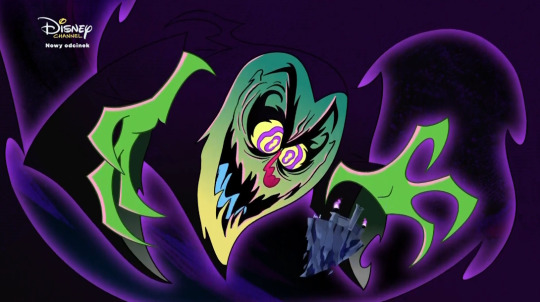
Jinx vs The Human World is... certainly an episode. It hasn't been talked much in comparison to The End because it has been greatly overshadowed by the later.
One thing that i think many of us can agree about Jinx vs The Human World is that it has super chaotic pacing. It doesn't give you room to breathe because it is already jumping to the next plot point and you can't digest well what you are watching. This hurts the emotional impact crucial character scenes have, because again, they aren't allowed to flow well, not letting the characters to react properly.
It's an episode that should have been around 44 minutes long since it covers multiple plot threads. With that ammount of time some things could have been better paced and given a proper conclusion.
As for the plot threads, i already talked about how i like Jinx as antagonist in this episode. She is fun, her song sequence is pretty good. She ends up capturing Molly and using her as away to power up her sobgoblins.
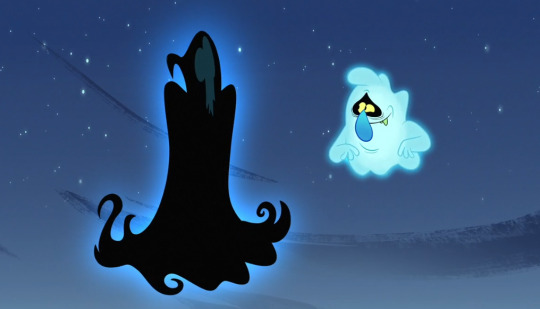
I really enjoy seeing Scratch finally having to deal with the consequences of not being a good leader. The reason the events of this episode happen are because of his own irresponsibilty, letting Jinx steal the Chairman robe and take over the Ghost World. He realizes that he has been messing up a lot and someone else should be in charge instead. He lets the chairman robe go and chose a more appropiate candidate to be the new chairman.
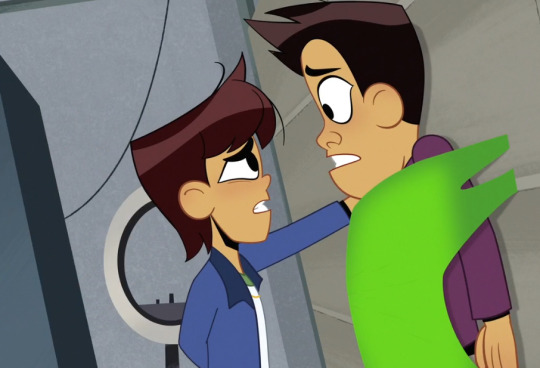
My biggest issue would be the Chens plot part. I do like the part of Ollie and June standing up to Ruben and Esther and trying to persuade them into helping them to stop Jinx. It's a scene that serves more or less well as a conclusion for their arc, even if Necro-Comicon and The Grand Gesture have this purpose, (more for Ollie's character)

The reveal that Geoff was the ghost that scared Ruben was nice too. It has been a thing that was foreshadowed back on ¨Book Marks The Sprite¨
What i'm not so fond of is how it was Geoff sneezing at him when he was a kid. I think it could been more interesting if it had been Geoff hurting Ruben by accident or scaring too much. That way Geoff apologizes to Ruben, showing to him that he didn't mean to hurt him that way.
Ruben also feels like he lacks proper scenes to show his change of mind. Sure, he realizes that Geoff wasn't evil as he thought he was, making him question things. But there isn't much else. I think there could have been a scene of Geoff saving Ruben from the sobgoblins and Ruben realizes how a ghost saved him, making him reconsider his views.
His change of mind is like it comes a bit out of nowhere. Another problem is how he seems to be super friendly around ghosts near the end which it is very weird. I think it could have been better if he had some expressions and lines that indicates that he is still trying to get used to not seeing ghosts as evil.
In addition to this, the Chens don't get to do much in this episode outside of trapping Jinx inside the phantom canister. I wished that they could have set up traps to catch the sobgoblins and contain them temporary at least, that would have given them a bigger role in the plot.
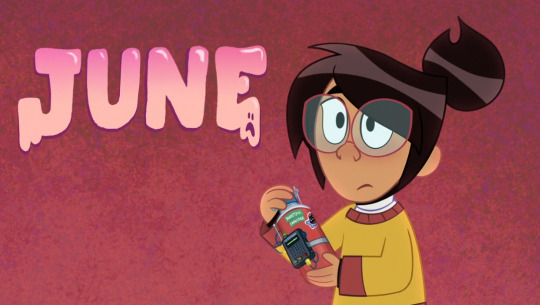
I do like some moments that June has, like her interations with Darryl and giving some funny moments. She is pretty enjoyable in this episode and she shines almost scene she is in.
In some other problems, i find the whole wraith transformation of ghost friends unnecessary, it doesn't have any funtion in the story aside from seeing how they look as wraiths (which is cool!) but the plot could have played out the same if it had been just Scratch and Molly going to the Ghost World.
The Ghost Council saying nice things about Scratch and that he wasn't so bad to give Molly joy fits well their character arcs this season, but, Sir Alister saying they are Scratch's ¨friends¨ doesn't add up since Scratch doesn't want anything to do with them and he has interacted with them because he was forced to be the Chairman in first place. I would change that line of dialogue and leave it as them thinking that Scratch is not so bad instead.
In all, i think what really hurt Jinx vs The Human World is that it needed to be a way longer episode (around 40-50 minutes) to allow things to be spaced out better. A good chunk of the issues from this episode seem to come from that. With more time to explore the events and changing some things, this episode could have been more presentable in quality as a whole.
#the ghost and molly mcgee#tgamm#tgamm season 2#Tgamm jinx vs the human world#Jinx tgamm#scratch mcgee#ruben chen#ollie chen#june chen#tgamm geoff
72 notes
·
View notes
Text
The Great BNHA Review: Potential
So I'm actually gonna be splitting this into four parts and then one more wrapping up how I feel about the ending and the overall series. The topics I'm going to talk about are the following.
The potential the characters had and how Hori squandered them.
The world they live in and how things are done in society, only for nothing to really change in the end and for things to not make sense.
The morals and messages it tries to convey.
And then (REDACTED).
Anyways, let's get going with Potential.
With a cast of characters as interesting looking as they were and the glimpses of personality we saw, like Jiro thinking she has to choose between being a hero or a musician, or Shoji and mutant discrimination. You would think that with how interesting the class looks, that they would get some role in the story or their own respective arcs to expand on their characters.
Except that's not what happened.
The main focus most of the time either falls on Izuku, Bakugou, Shoto, and sometimes Ochako. So that's four out of twenty students that gets the spotlight while everyone else is regulated to minor characters who are only brought in to fights.
Which is honestly kind of disappointing because many of them look to have stories waiting to be told and can be good characters! Because I wanna learn more about Sero, I wanna learn more about Hagakure, I wanna learn more about Shoji. But now that the manga's over, that's not gonna be possible.
This is especially terrible since in the final war arc half of the fight is just fucking flashbacks to expand on some of the characters fighting when it should've been something covered earlier in the manga instead of hyping Bakugou up. It all just feels too little too late and makes things cluttered and unorganized.
And then we have the villains.
They were kind of cool when they got introduced and had a lot of potential to challenge the heroes. To really make them open their eyes to how flawed their society is and why it needs to change. They could each have an upbringing that brought them to where they are now and why they wanna join to make a difference. They could be some compelling and intriguing antagonists for the heroes to face.
... Except we don't get any of that.
What really hurts the villains in this series is how Hori tends to flip flop between making them sympathetic and their heroic counterparts wanting to save them, and making them so cartoonishly evil that the villains from the POWERPUFF GIRLS comes off as more compelling compared to them!
And it's like... pick one or the other Hori! Either they're victims of society or they're just irredeemable! And what sucks the most about this is that they HAD something going on! They could've rise from losing AFO and promise to make a change for the better! The My Villain Academia part shows how this was possible!
But instead they ended not in a bang... but a whimper. they all pretty much died in the end or confirmed to the very society that hurt them so what was the point of trying to redeeming them?
Then finally... we have the main character himself. Izuku Midoriya.
Oh how Hori utterly failed you...
You started off so promising in the first two episodes, You could've been a quirkless hero to make the message of anyone can be a hero really have an impact. You could've rose from your pain and suffering and show everyone what you can really do.
But sadly that's not what happened. You were given a quirk that hurts you, nobody really helps you with it, you're forced to work with your bully and never grow out of the mindset that he's awesome, every adult you associate with has failed you in some way, you're forced to distance yourself from your friends so Hori can have his Cash Cow Triplets, you're never really challenged in any unique way other than "just punch your problems away", and ultimate... you just became a watered down version of what you started off as with no introspection whatsoever.
I have never seen a character so stagnate in their arc and development in such a series before, only beaten recently by Vaggie in terms of just never growing or learning anything else.
Izuku really deserves to be in a story with an author that can utilize his potential to the fullest and give him the love and attention he deserves, because this series and Hori just wasn't it.
As for the Pro Heroes, they really were nothing in the end. All they can summed up as them just saying.
"Our society is bad, it's up to the next generation to make things better in the future. We need these teenagers to fight in wars because only they stand a chance compared to us bumbling adults!"
That's all that I get from them.
Stay tuned for next post where we'll look into society and how it's flawed, and what the characters do to change (not really) any of it.
27 notes
·
View notes
Text
periodically i come across some baffling discourse centered around the earliest parts of Immortal Hulk: specifically, characters like the gunman and immortal scientist father from the first couple of issues of Immortal Hulk, during a point where we don't really know WHAT the Devil Hulk is actually up to and we have to piece together the rumblings of the plots, with Jackie McGee as arguably our viewpoint character (since while we see Bruce's perspective, we have no more clue of what's going on with him, and McGee puts the pieces together)
specifically, the discourse i find inexplicable is people arguing that those two antagonists were unfairly victimized by the Devil Hulk or that it would be in character for him to be sympathetic towards them instead of the brutal torments he visits upon them as punishments for their crimes (murdering several people in a gas station robbery including a young girl, and killing a lot of people personally and by extension) and I find this kind of argument to be incredibly baffling!
This is also compared to Charlene MacGowen, whom is recruited by the Hulk after she is previously a member of a group hunting the Hulk and experimenting on gamma mutants; the Hulk hires her after taking over the group, rather than tormenting or killing her has he does previously. I've seen people try to argue that Hulk SHOULD have done the same with those previous characters, or think its unfair of them.
And the rebuttal to this, starting with 'of course he didn't, they deserved what they got' amounts to a few different points. The first is that Immortal Hulk is a horror story. The Devil Hulk is very explicitly a horrifying force of retribution; when he brutalizes the gas station robber by beating him so badly he will be in a coma for the rest of his life, or rips the limbs off an undying man and leaves him to rot underground, deprived of all sensory input forever, its SUPPOSED to be uncomfortable and horrifying, if a twisted form of justice.
The second part of it involves a bit of analysis.
The robber, well, robs a gas station to pay off debts. He's scared, trying to provide for his family and in over his head; he's thus a scared man whose murders are partially a result of panic. However, Hulk's insight all but states that he killed because he wanted to kill people to feel strong. He discusses how the man was at the target range, tempted by the thought of letting that power loose. He killed several people, including a young child not too different from his own child, not because he was scared... but because he WANTED the power of it, to kill just because he could. Tellingly, when the Hulk outright says so, he loses his nerve and instead of trying to argue or justify himself, pleads for mercy. He asks "I'm not a bad man... am I?" And the Hulk simply leers and asks what he thinks, the implication being that he IS, and he knows it, as the Hulk delivers his gruesome fate.
The scientist is initially less malicious; afraid of death, he created a gamma-based treatment to save himself and his son, but when he injected his son with it, killed him on the spot, and over time, his own treatments mutated him into a gamma mutant; an undying man with his skeleton visible through his skin, death incarnate. His crimes are two-fold; beyond accidentally killing his son, his son... didn't stay dead. He's still alive down there, insane from the sensory isolation, while his radioactive body is killing everyone who comes to the graveyard to mourn, suffering lethal radiation poisoning.
To quote Hulk himself, "How many died because you were scared!?"
That's not the end of it though; the scientist is also deliberately and explicitly murdering everyone who comes across him to cover up what's happened to him, and he has killed a lot of people this way.
This is where we come to MacGowen. She's not particularly innocent compared to them, working for the primary antagonist of the comic at that point, but the crucial difference is that while she, just like them, has largely been forced in to her situation, there is one very big difference.
The gas station robber did the robbery to pay of a debt and care for his family, but he also killed multiple people because he wanted the power of it, needlessly doing so just so he could feel big and tough. The scientist accidentally killed his son and a LOT of other people due to radiation poisoning, but he also deliberately killed many other people to cover up what he had become, even though this served no purpose.
In the same situation, MacGowen actively tries to minimize the suffering of gamma mutants she's studying (specifically the scientist's son, driven to insanity by the deprivation and experiments performed on him too), going out of her way to do so. She puts herself at significant risk to do this, fully aware that other people working in the same organization are facing horrible suffering and punishment for going against orders, and she is DELIBERATELY doing so, doing the best she can even as it means her potential death.
She goes the extra mile to try to comfort and minimize suffering, even when its not actually going to do her any good, and might outright get her killed, but she still does it. This is the reason why, I think, the Devil Hulk chooses to recruit her.
The robber and scientist didn't minimize any suffering; they outright killed people because they could, or because they were scared. MacGowan goes out of her way to help others, at very serious personal risk, after being stuck in a bad situation with no real hope of things getting better for herself. The Devil Hulk's sense of justice is uncompromising and cold, demanding accounting for the crimes you've commited, and the first two here answer him by first making excuses and then weakly begging for mercy, pleading that they don't deserve it, and he is unmoved. MacGowan doesn't make any such excuses, but just does the only thing she feels she can, which Devil Hulk actually DOES respect.
In other words, from a moral perspective, they're weak and cowardly, hurting others and then begging for a mercy they never shared with anyone. They're puny. And as Joe Fixit himself later says, the likes of McGee (and later, MacGowan) ain't puny.
#marvel#hulk#immortal hulk#analysis#also why WOULD he recruit the robber?#he was literally just some guy that murdered several people and cried about it without any real intention of fixing the mess he made#the scientist at least had some skills even if its not in character for Devil Hulk to do anything but make him suffer for his crimes#he is after all the DEVIL Hulk#dealing out horrifying retribution and cruel justice is his entire Thing#queued
15 notes
·
View notes
Text
I had to stop my homework just to focus on this. Y'all better be glad.
- the trailer of episode 1 just dropped... It's prediction time, you FUCKS.
- anyways, something that anyone i can notice in this trailer is that it focused on 9 characters.
Whose are; Anastasia, Ted, Isabel, Alessio, Ivy Marissa, Lyndia, Spencer and Amelie. I theorize that they'll either be really important to the season or just make the plots of episode 1 happen.
(I think that the ones that will actually be important will be Anastasia, Ted, Lyndia, Isabel and maybe Marissa. I could've put Spencer on there too but I already know that he is just there to be the disventure camp Twink™ of this season, I just know he isn't a big deal)
1. Anastasia:
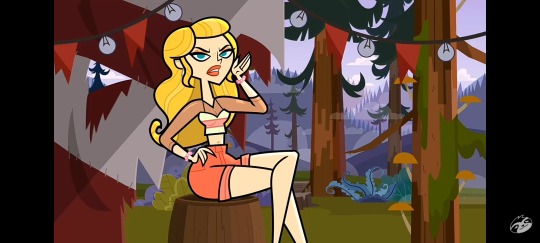
- umm... Funny story but-- the UNIC audition tapes that I've saw we're from Ted, Richard and Isabel. So I was surprised with her accent, I think that she'll be the main antagonist of this season. I just can't look at her and Don't see a fusion of Heather and Julia, my predictions is that she'll pull a Heather move on half of the cast till she either go to the finals or at least till the final 5.
2. Ted:
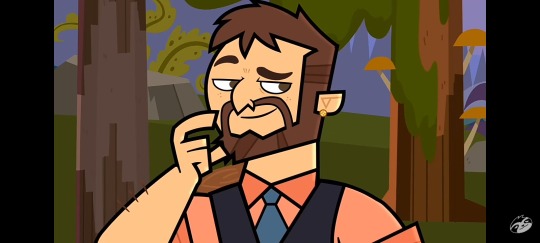
- MY MEN WILL BE IMPORTANT AND NOT JUST A JOKE ANTAGONIST, I SWEAR. I'm already not normal about him but with the fact that he'll definitely do something in this season actually makes me wanna tweak out, I don't think that'll he be a heather type of manipulator but a Scott one. He'll definitely have the S1 Ripper and ROTI Scott treatment, he will either be hated by the fandom or the characters in the show but will still go far.
AND I HOPE SO, I really want to him to go to the merge or finals and eliminate Spencer along the way, I already have a beef on Spencer just because of DCAS Jake and I want that ugly ass Twink to simply be humiliated along the season. Is that cruel? Yeah, but he's a white twink that it's own character development will definitely go around a guy that he'll date, don't take it seriously.
(you all bet me a follow if I'm actually right about the fact that Spencer and Diego will date)
3. Isabel:
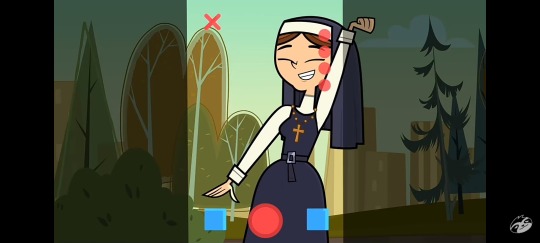
- GIRLIE IS A TIKTOKER??? Okay, you know what? Girl literally killed the "antagonist" allegations. I just hope that her interactions with Natalia aren't the same that with S1 Gabby and Grett, I want them both to be friends 😭😭 (or girlfriends. Wait, am I allowed to say that I lowkey ship them 2??)
4. Alessio:
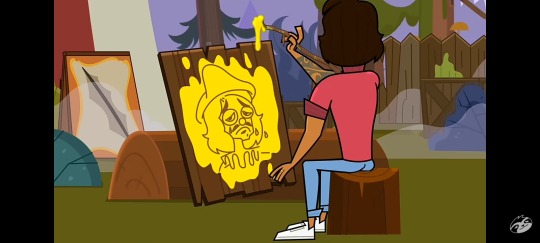
- umm... Well... Yeah, he's definitely on my favorite characters list. HE GIVES HUGE "festa?" BY SUPERCOMBO VIBES I LOVE HIM. I WANT TO DRAW HIM LIKE THOSE GRIMM EMO ALBUM COVERS LIKE: The jaws of life by Pierce The Veil, Fever by Bullet for my valentine and Silverstein's discovering the waterfront. I WANT TO DRAW HIM AND MAKE HIM BEAUTIFUL STOP.
Anyways, I think he'll have some fun dinamics with the characters. I think it would be fun if him and Ted Interact alot, Ted would definitely love to annoy him and Alessio just wants him to die. I don't know, they give Ripper x Damien vibes...
5.Ivy:
(I forgot to take a screenshot of her, sorry. I'll probably put in here later)
- My first impressions on her is that she would've been this season's Gabby or Izzy but she low-key gives Dakota & Nichelle vibes...?? Like, Nichelle because she is an actress and wants to proove that not all actresses are bad people and Dakota because she's rich but is genuinely really nice and caring to the people around her. Until now I actually like practically the entire cast
(not counting with Benji and Spencer. If they we're my Ocs I would do horrible things against them.)
6. Marissa:
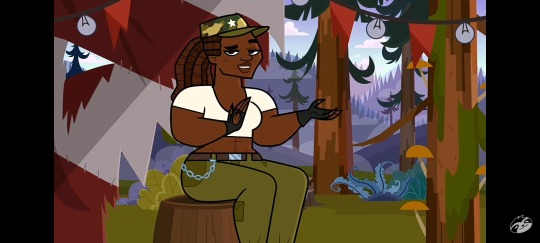
- I have a HUGE feeling that she'll end up like S1 Axel oh lord. And also, I HOPE THAT DOESN'T HAPPEN WITH HER. On TDI 2023 I love both Axel and Ripper but on S1 they made their team lose and voted Axel instead of Ripper and the fandom started to hate him, AND THAT TIME GIVES ME PTSD. ONC FOR THE LOVE OF GOD DON'T DO THIS TO ME AGAIN😭😭
Anyways, again. She gives off huge Axel vibes. But like, a fusion of Axel and Leshawna. She's Strong but she also seems pretty nice and caring to the people, and judging by how she acted on her audition tape and what she said during this trailer, she'll definitely slay a lot of times. Anyways, I LOVE HER, ONC PLEASE DON'T MAKE A RIPPER VS AXEL FANDOM DISCOURSE 2.0 STOP I'M SCARED 😭😭
7. Lyndia:
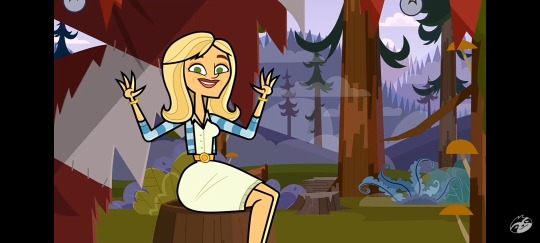
- she's actually so nice and cute?? I already love this women. But again, I strongly believe that mostly of the time she'll be there so someone can ask her to vote on someone. I don't believe that she'll just be a S2 Ally and stuff, but I also think that she's well aware of what she'll will be go through and she'll be confident enough to actually go far in the (different of Ally, whoops! You haven't heard nothing.)
8. Spencer:
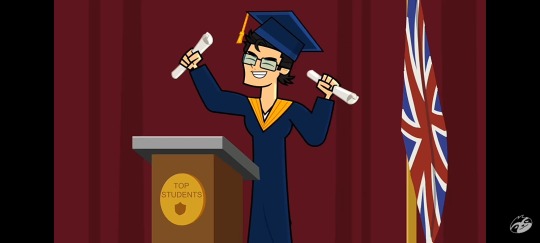
- ... Is it cruel that I want him to go through the worse on this season just to lose in the end? Seriously, I really don't expect much of this character but just to be there to be the be part of the Gay Couple™ of this season. I'm sorry but I actually don't like this guy really much and I genuinely think he's just there for fandom "oh! A Twink!" Gaze.
- 9. Amelie:
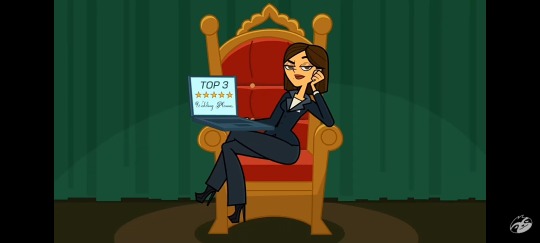
- okay, she's actually the one that I wanted to take about the most (not counting with *giggle* Teeeed😻😻)
For me she's most likely the Eva of this season, but I don't want her to end up just LIKE Eva. I WANT THIS WOMEN TO EAT EVERYONE UP, she gives huge "I'm on my way" vibes. Oh and also, the fact that's she's REALLY strong will mostly be really helpful to her team on this season. And maybe... Even be an antagonist? GIRL IS WAY TOO PRETTY JUST TO BE ELIMINATED.
And by conclusion, I hope Benji dies, Spencer receives hell, Ted becomes more loved than what Ripper was (or hated just to I have him to all my self...) and Amelie or Jade win (or Ted, idk)

#deimos post#gay loser post#disventure camp carnival of chaos#disventure camp anastasia#disventure camp ted#disventure camp isabel#disventure camp alessio#disventure camp#disventure camp ivy#disventure camp marissa#disventure camp lynda#disventure camp spencer#disventure camp amelie
13 notes
·
View notes